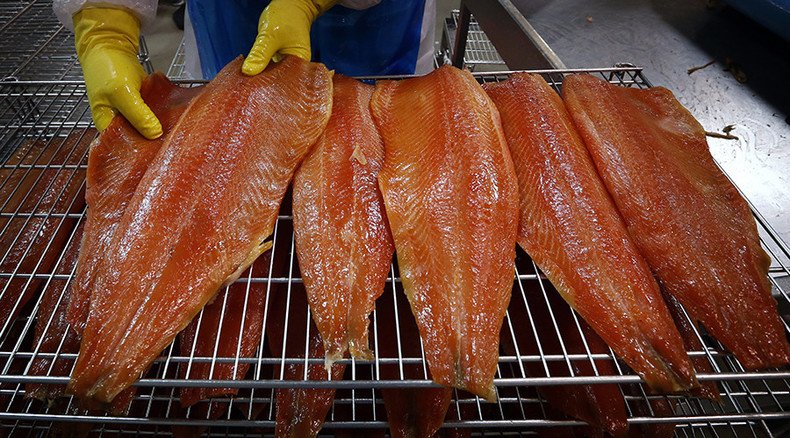‘Frankenfish:’ GMO salmon declared safe to eat, environmentalists rail against FDA

The US’ food regulator has given a green light to the world’s first genetically-modified salmon, labelling them safe to eat, while not requiring them to be labeled. However, the FDA’s first ever approval of a “GM animal” has been met with fierce criticism.
The newly-approved fish, called the AquAdvantage salmon, has had its DNA engineered to make it grow twice as fast as a usual one. The FDA has ruled that the recombinant DNA (rDNA), which contains a growth hormone gene, meets the definition of a drug.
“The FDA has thoroughly analyzed and evaluated the data and information submitted by AquaBounty Technologies regarding AquAdvantage Salmon and determined that they have met the regulatory requirements for approval, including that food from the fish is safe to eat,” said Bernadette Dunham, D.V.M., Ph.D., the director of the FDA’s Center for Veterinary Medicine.
While regular salmon reach market size in 32-36 months, the innovative AquAdvantage fish only needs between 16 to 18 months.
Food fight: FDA targets illnesses that sicken 48 million Americans a year https://t.co/II6EYAbaJIpic.twitter.com/uW92SVsYKL
— RT America (@RT_America) November 14, 2015When it comes to nutrition, the DNA-customized salmon, raised in land-based tanks, is said to be no different than farm-raised Atlantic salmon currently found at grocery stores across the US. However, the FDA has forbidden the breeding of AquAdvantage salmon on US territory, saying that the GM fish can only be raised in hatchery tanks located either in Canada or Panama.
“In fact, under this approval, no other facilities or locations, in the United States or elsewhere, are authorized for breeding or raising AquAdvantage Salmon that are intended for marketing as food to US consumers,” the regulator said.
Retailers themselves can decide whether or not to label the fish as “genetically modified” when they arrive in US stores – the FDA does not require them to do so.
“We recognize that some consumers are interested in knowing whether food ingredients are derived from GE sources,” said Susan Mayne, Ph.D., director of the FDA’s Center for Food Safety and Applied Nutrition. “The FDA is issuing two guidance documents that explain how food companies that want to voluntarily label their products can provide this information to consumers.”
Addressing the environmental issue, the FDA said the approval of GM salmon “would not have a significant environmental impact.”
AquAdvantage salmon are reproductively sterile fish, so even in the event of escape, which the FDA stressed is a very unlikely scenario, they would be unable to interbreed or establish populations in the wild. There are also barriers in the tanks and plumbing that carry water out of the facilities to prevent the escape of eggs and fish.
Despite the precautionary measures, environmental groups have criticized the FDA decision.
“There’s no place on our dinner plates for genetically engineered fish,” Dana Perls, food and technology campaigner at Friends of the Earth-US, said in a statement. “We will continue to work to ensure the market, from grocery retailers to restaurants, continues to listen to the majority of consumers that don’t want to eat this poorly studied, unlabeled genetically engineered fish.”
The Center for Food Safety (CFS) even plans to take the FDA to court, saying that the agency has “neglected its responsibility to protect the public.”
“The fallout from this decision will have enormous impact on the environment. Center for Food Safety has no choice but to file suit to stop the introduction of this dangerous contaminant,” said Andrew Kimbrell, executive director of Center for Food Safety.
The CFS slammed the FDA’s approval process, saying it “was inadequate” and “lacked a comprehensive analysis.”
The “frankenfish” – as it has been dubbed by some – has been the subject of arguments and disagreements for several years now. The FDA first announced that it would consider approving genetically engineered salmon for consumption in August 2010. In 2011, Congress voiced concerns about its safety, saying it would try to keep the AquAdvantage salmon out of stores. In Alaska, modified salmon are seen as a threat to the state’s wild salmon industry.
READ MORE: Congress tries to keep frankenfish out of stores
According to the CFS, more than 1.8 million people opposed FDA approval of genetically engineered salmon in 2013.













